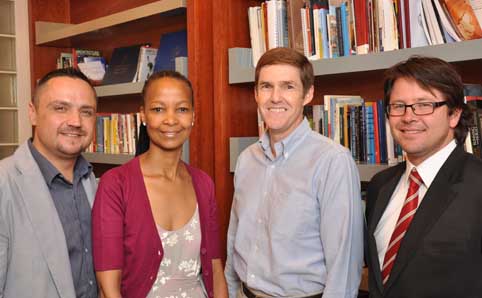 |
|
A delegation from the US consulate came to learn more about our transformation initiatives and the Leadership for Change programme. From the left are: Prof. Aldo Stroebel, Director of International Academic Projects in the Office of the Vice-Chancellor; Mrs Dineo Gaofhiwe-Ingram, Assistant-Director: International Affairs; Mr Earl Miller, US Consul-General; and Mr Rudi Buys, Dean of Student Affairs.
|
When others visit our university to learn more about our transformation initiatives, we certainly are on the right track.
Mr Earl Miller, Consul-General at the United States Consulate in Johannesburg, paid our university a visit as part of his orientation trip to the Free State.
Mr Miller, who was accompanied by two senior colleagues from his office, was interested to learn more about our university’s initiatives relating to transformation, the Leadership for Change programme and the work done at the International Institute for Studies in Race, Reconciliation and Social Justice.
He met with some of the students who had recently returned from the USA and Europe to reflect on their experiences on the programme and expressed his appreciation for the initiative, since it also afforded American students an opportunity to learn from their South African peers.